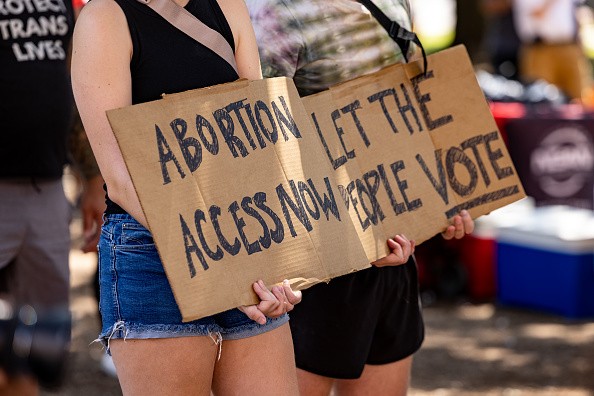Kate Cox, a pregnant Texas woman, asked a judge to grant her abortion access despite Texas's strict ban after her fetus confirmed lethal fetal diagnosis.
Cox has filed a lawsuit against the state seeking an emergency court order, which was believed to be the first of its kind since the state banned virtually all abortions after the Supreme Court overturned Roe v. Wade last year.
Cox Asks Judge to Grant Abortion Access

The lawsuit, filed by the Center for Reproductive Rights, asks the court to halt Texas's abortion bans for Cox temporarily. She was currently 20 weeks pregnant, and her fetus had been diagnosed with full trisomy 18, a chromosomal anomaly that leads to miscarriage, stillbirth, or the death of the infant after birth.
"If Kate is not allowed to have an abortion in Texas, she will be forced to continue the pregnancy until she either miscarries or gives birth to a stillborn or to a baby that could live only minutes. Her only other option is to try to flee the state," the group said.
The state prohibits all abortions from the point of fertilization. The state also implements a bounty law that rewards private citizens who sue others who have helped a person get an abortion.
However, the law has exceptions to save the life of the mother, but the law remained vague on what constitutes such a risk, which advocates were trying to force the state to clarify.
The doctors advised Cox that the safest option to protect her health and future fertility was to get an abortion. But as long as there was fetal cardiac activity, she would not be able to have abortion access in Texas.
The lawsuit stated that if the heartbeat stopped, doctors could offer her a labor induction. However, prior to cesarean sections from her earlier pregnancies, induction carries a serious risk of uterine rupture.
Abortion rights advocates and women with dangerous and nonviable pregnancies requested the state to clarify the medical exemptions so doctors could perform abortions without fear of losing their licenses or being prosecuted.
A district court judge previously ruled that the laws should not apply in cases where the mother's health was at risk, or the fetus would not survive after birth. The Texas Office of the Attorney General appealed that ruling, putting it on hold, and the state Supreme Court would decide in the coming weeks.
However, the lawsuit noted that Cox immediately needed an abortion. Cox's attorneys were now seeking a narrow injunction to allow the abortion and protect her doctor from prosecution and her husband from facing civil penalties under the state's bounty law.
Cox said she was trying to do what was best for her baby and herself, but the state was making them both suffer.
Read Also : Macy's Stabbing: Philadelphia Man Fatally Stabs Security Guard, Injures Another During Retail Theft
Supreme Court Overturns Roe v. Wade's Right to Abortion
After nearly half a century, the US Supreme Court officially declared that the constitutional right to abortion no longer exists.
The decision in early May has pushed abortion rights to be rolled back in nearly half of the states immediately, with more restrictions likely to follow. The court's decision has made millions of American women lose a fundamental constitutional protection.
Several states, such as Mississippi, North Carolina, and Wisconsin, still have decades-old abortion bans.








